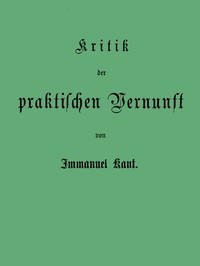Kant's gesammelte Schriften. Band V. Kritik der praktischen Vernunft. by Kant
"Kant's gesammelte Schriften. Band V. Kritik der praktischen Vernunft" by Immanuel Kant is a philosophical work published in 1788. This second major critique examines how pure reason determines moral action through the Categorical Imperative. Kant rejects traditional moral foundations based on feeling or divine will, arguing instead that morality stems from reason itself. The work explores fundamental questions of ethics, freedom, and the nature of good and evil, establishing principles for moral
judgment accessible to all. (This is an automatically generated summary.)
Read or download for free
| How to read | Url | Size | |||
|---|---|---|---|---|---|
| Read now! | https://www.gutenberg.org/ebooks/49543.html.images | 623 kB | |||
| EPUB3 (E-readers incl. Send-to-Kindle) | https://www.gutenberg.org/ebooks/49543.epub3.images | 229 kB | |||
| EPUB (older E-readers) | https://www.gutenberg.org/ebooks/49543.epub.images | 238 kB | |||
| Kindle | https://www.gutenberg.org/ebooks/49543.kf8.images | 409 kB | |||
| older Kindles | https://www.gutenberg.org/ebooks/49543.kindle.images | 354 kB | |||
| Plain Text UTF-8 | https://www.gutenberg.org/ebooks/49543.txt.utf-8 | 510 kB | |||
| Download HTML (zip) | https://www.gutenberg.org/cache/epub/49543/pg49543-h.zip | 210 kB | |||
| There may be more files related to this item. | |||||
About this eBook
| Author | Kant, Immanuel, 1724-1804 |
|---|---|
| Title | Kant's gesammelte Schriften. Band V. Kritik der praktischen Vernunft. |
| Note | Wikipedia page about this book: de.wikipedia.org/wiki/Kritik_der_praktischen_Vernunft |
| Credits |
Produced by Jana Srna, Norbert H. Langkau and the Online Distributed Proofreading Team at www.pgdp.net |
| Reading Level | Reading ease score: 55.9 (10th to 12th grade). Somewhat difficult to read. |
| Language | German |
| LoC Class | B: Philosophy, Psychology, Religion |
| Subject | Ethics |
| Subject | Practical reason |
| Category | Text |
| EBook-No. | 49543 |
| Release Date | Jul 29, 2015 |
| Most Recently Updated | Oct 24, 2024 |
| Copyright Status | Public domain in the USA. |
| Downloads | 1163 downloads in the last 30 days. |
| Project Gutenberg eBooks are always free! | |

